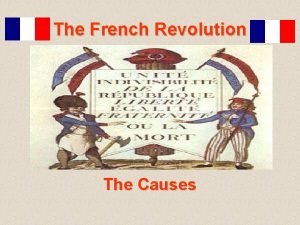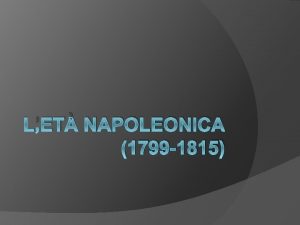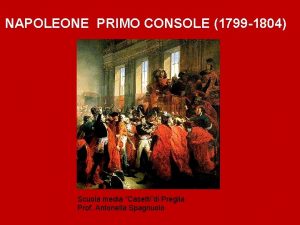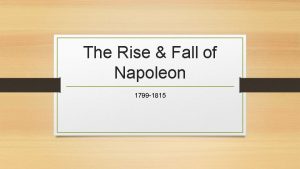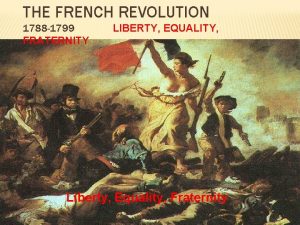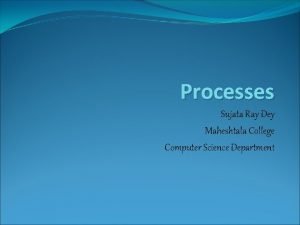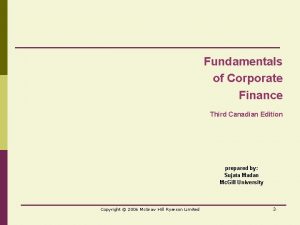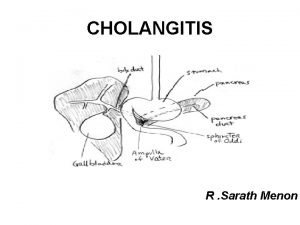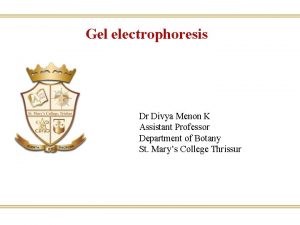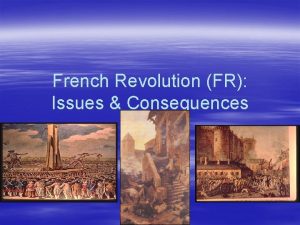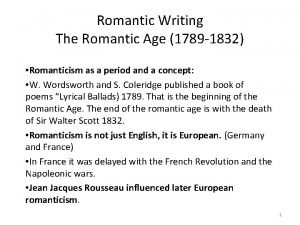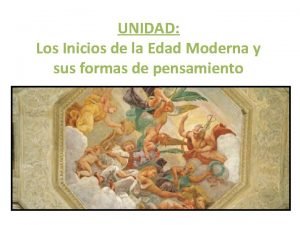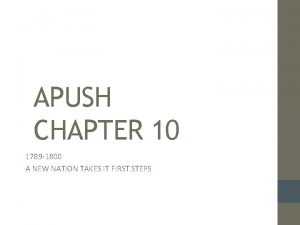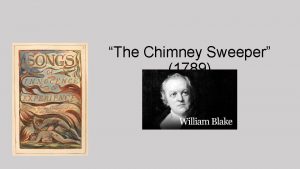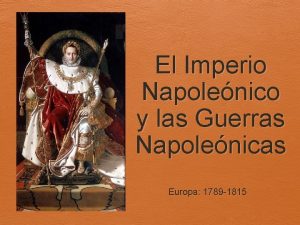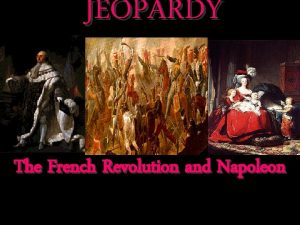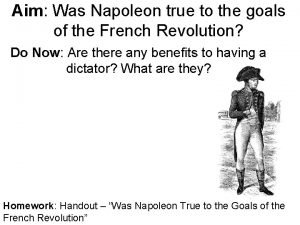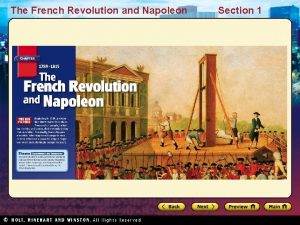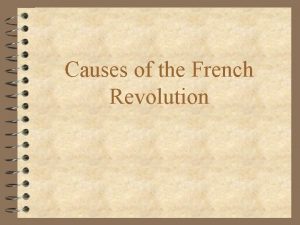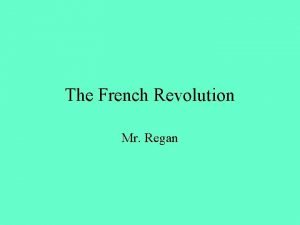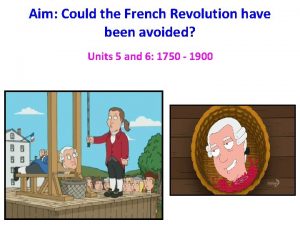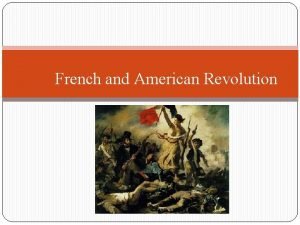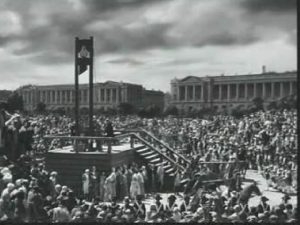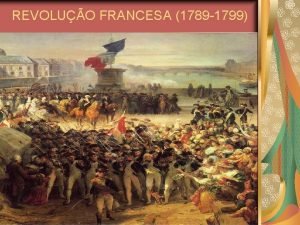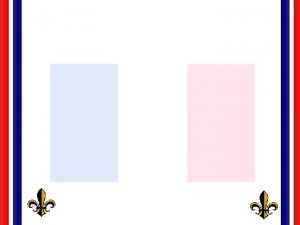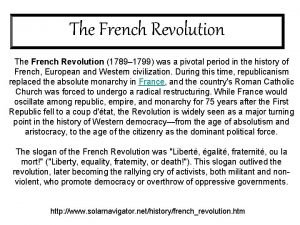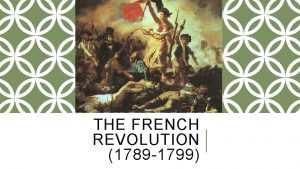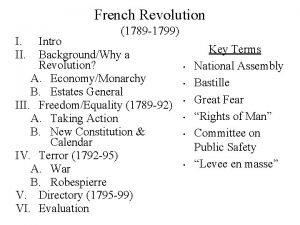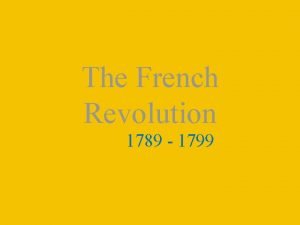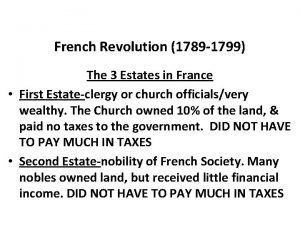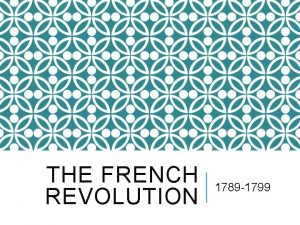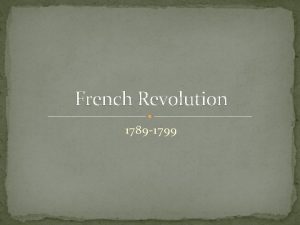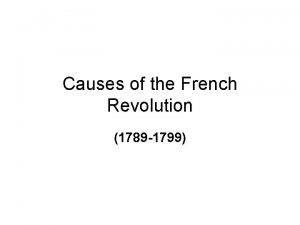French Revolution 1789 1799 Dr Sujata Menon Four


































































- Slides: 66

French Revolution- 1789 - 1799 Dr. Sujata Menon

Four Phases of the French Revolution Moderate Phase- National Assembly (1789 -1792) Radical Phase- Convention (1792 -1795) corruption and chaos Directory (1795 -1799) Dr. Sujata Menon

Political conditions in Europe on the eve of French Revolution Old Regime – socio-political system of Europe during the 18 th century Absolute Monarchy Unprivileged people – paid taxes and treated badly Privileged people – did not pay taxes and treated well Dr. Sujata Menon

Absolute Monarchy under Bourbon Dynasty in France French King Louis XIV ( 1643 -1715) -the Sun King. “I am the State” Dr. Sujata Menon

Dr. Sujata Menon

causes French Society Three Orders or Estates Ø First Estate - Privileged class included the Clergy Class mainly high-ranking members of the Church Ø Second Estate - Privileged class included the nobility Ø Third Estate - Unprivileged class included common people from peasants in the countryside to wealthy merchants , Professionals and Urban Workers in the cities Dr. Sujata Menon

First Estate Clergy - formed one percent of the total population and divided into two groups: upper and lower. Ø Exempted from Taxes Ø Possessed wealthy Church Land Ø Levied a tax called ‘Tithe’ comprising of 1/10 of the agricultural produce Catholic Church and Clergy formed the first Estate Dr. Sujata Menon

Second Estate- Nobility Court Nobility - composed of about 30, 000 families with ranks like Duke and Duchess, count and countess, and marquis and marquees. Ø Exempted from Taxes Ø Owned Titles and Ranks Ø Levied Feudal Dues or Manorial Dues(Taxes) Feudal Taxes Ø Taille a direct state tax levied on underprivileged Dr. Sujata Menon

The Third Estate Underprivileged Class- 97% of the population of France Divisions- Bourgeoisie or Middle Class, peasantry, and City Workers or Sans culottes. Burden of taxes fell on Third Estate. “the nobles fight, the clergy pray, the people pay”. Dr. Sujata Menon

Third Estate- Peasants French Peasantry France’s economy was primarily agriculture based. Peasants paid a large number of feudal dues to church, lord and King Poor harvests meant that peasants had trouble paying their regular taxes. Dr. Sujata Menon

Third Estate - Sans culottes or Urban Workers Sans culottes— common people with Trousers without Breeches. They were working class of cities The sans-culottes were the driving force behind the revolution Sans-culottes believed in radical Republican ideology -Equality. They became Revolutionary Citizens Dr. Sujata Menon

Third Estate - The Bourgeoisie Powerful Middle Class. They had both ‘’brains and money. ” Ø Wealthy and influential Merchants and Manufacturers Ø Well Educated professionals such as lawyers, doctors, teachers or administrative officials. Ø Believed that no group in society should be privileged by birth rather believed in Social position based on merit. Ø favored a society based on freedom and equal laws and opportunities for all Dr. Sujata Menon

Dr. Sujata Menon

French Monarchy on the eve of Revolution Louis XV (1715 -1774) fought the Seven Years War against England which brought nothing for France became bankrupt due to over expenditure in wars and luxury. He realised it later on. Before his death he cried-‘After me the Deluge’. Dr. Sujata Menon

King Louis XVI- (1774 -1793) A person of mediocre intelligence , had a good heart but was unable to relate to people on a personal level. He inherited a country with economic distress, social unrest, a debauched court, and problems with the nobility Dr. Sujata Menon

Marie Antoinette Considered as Irresponsible followed an Extravagant lifestyle Being Austrian, she was terribly unpopular in France and had few friends. Dr. Sujata Menon

The Palace of Versailles The King and Queen of France lived in luxury and splendor at the magnificent Palace of Versailles outside of Paris. Dr. Sujata Menon

French intellectuals or Philosophes questioned Ancient Regime institutions Philosophes were secular in thinking – they used reason and logic, rather than faith, religion, and tradition, to answer important questions Used reason and logic to determine how governments are formed �Tried to figure out what logical, rational principles work to tie people to their governments Questioned the divine right of kings Dr. Sujata Menon

Philosophers Voltaire ( 1694 -1778) Propagated theory of enlightened absolutism Ridiculed many institutions of Old Regime particularly attack the Corruption in the Church Montesquieu ( 1689 -1755) - Propagated constitutional form of government - ‘The Spirit of the Laws’, proposed a division of power within the government between the legislative, the executive and the judiciary. Dr. Sujata Menon

Cont… Jean Jacques Rousseau (1712 – 1778) - Father of the French Revolution -Social Contract – political philosophical work starts with ‘ Man is born free but is everywhere in chains’ - proposed a form of government in which the citizens give up some of their rights to the government in exchange for the government giving the citizens equality and freedom Dr. Sujata Menon

Spread of Enlightened Ideas The ideas of these philosophers were discussed intensively in salons and coffee-houses spread among people through books and newspapers frequently read aloud in groups for the benefit of those who could not read and write. Dr. Sujata Menon

French Coffee House Dr. Sujata Menon

France on eve of Revolution Bankrupt France was bankrupt and in financial crisis in 1788 -9 The crisis resulted from: An inefficient and unfair tax structure, which placed the burden of taxation on those least able to pay, the third estate A drained treasury which was the result of: In this cartoon from the time, Louis is looking at the chests and asks "where is the tax money? " �Aiding the Americans during the American Revolution �Draught of 1788 -1789 �Overspending by the Royalty and Privileged Classes Dr. Sujata Menon

Dr. Sujata Menon

Suggestion to tax Privileged class Turgot – Controller General of Finance – suggested drastic cuts in expenditure but was dismissed by the nobility Jacques Necker – suggested taxing the nobles Calonne – advise King to tax the nobles King was forced to call a meeting of the Estates General ( Parliament) in 1788. Dr. Sujata Menon

Summoning of The Estate General or Parliament Estate General was a Political Body to which the three Estate sent their Representative. It was a redundant Body and last convened in 1614 Dominated by Privileged Class Voting was done on the principle that each estate cast one vote. Dr. Sujata Menon

On 5 May 1789, Louis XVI called for Estates General to pass proposals for new taxes. When the Estates General met, each estate solemnly marched into the hall at Versailles. The nobility dressed in all their finery, the clergy dressed in full regalia and the third estate dressed in black. Dr. Sujata Menon

Cont. The first and second estates sent 300 representatives each The Third Estate sent 600 representatives from prosperous and educated section. Peasants, artisans and women were denied entry to the assembly. However, their grievances and demands were listed in some 40, 000 letters which the representatives had brought with them. Dr. Sujata Menon

The demands of the Third Estate Ø abolition of forced labor Ø prior consent of the people before taxes were levied Ø Right to vote per head instead of Order- the first and second Estates formed 5% and the third estate was 95%. Ø To unite all the three Estate to form a single body The King refused to grant their request. Dr. Sujata Menon

Abbe Sieyes Estate? - ‘What Is the Third Dr. Sujata Menon

The Tennis Court Oath, 20 June 1789 The leaders of third estate- Abbe Sieyes a Clergy and Mirabeau, a nobleman rallied the commoners of France to assert their power and take charge of the Estates General. At his suggestion, they declared themselves the National Assembly and invited the other two orders to join them. The next day they found their meeting hall locked. At the suggestion of one of the delegates they moved to a nearby indoor tennis court. Dr. Sujata Menon

Tennis Court Oath- Debating the Course of Action Mirabeau suggested to swear an oath of allegiance until a constitution had been created for France “Let us swear to God and our country that we will not disperse until we have established a sound and just constitution, as instructed by those who nominated us. ” The delegates agreed and 578 delegates signed Oath Their oath is known as the Tennis Court Oath, 20 June 1789. Dr. Sujata Menon

Recognition to National Assembly, 27 June 1789 The King expressed his displeasure at the event and termed it as unconstitutional Two days later a large number of clergymen and some nobles joined the National Assembly The King was unwilling to use force and eventually recognized it On 27 June 1789, National Assembly became legitimate body Dr. Sujata Menon

Declaration of the Rights of Man The new National Assembly created the historic and influential document The Declaration of the Rights of Man, which stated the principle that all men had equal rights under the law. Declaration of the Rights of Man (thoughts from Ideologues, Rousseau) "Men are born free and equal in their rights. . These rights are liberty, property, security and resistance to oppression. The fundamental source of all sovereignty resides in the nation. The law is the expression of the general will. All citizens have the right to take part personally, or through representatives, in the making of the law. " Dr. Sujata Menon

First Constitution of France , 1791 • Democratic features – France became a Constitutional monarchy • King became merely the head of state – All laws were created by the Legislative Assembly – Feudalism was abolished • Undemocratic features – Voting was limited to taxpayers i. e. Male tax payers – Offices were reserved for property owners • This new government became known as the Legislative Assembly ( 1789 -1791) Dr. Sujata Menon

Dr. Sujata Menon

The Civil Constitution of the Clergy The National Assembly resolved the immediate financial crisis by: Seizing church lands Putting the church under the control of the State with The Civil Constitution of the Clergy. (Abbe Sieyes fiercely resisted the passage of this legislation and accused the other delegates of "bourgeois envy. " But he was overruled. ) The Oath of Allegiance Clergymen were required to swear an oath to the new constitution. Many refused to swear the oath and were placed under arrest. The measure was very controversial to a nation of Catholics and drew support away from the new government. Dr. Sujata Menon

Events Leading to Revolution Events Food Shortage and High Prices- The price of bread was high and supplies were short due to harvest failures. Rumors spread that the King and Queen were responsible for the shortages Removal of Necker, who was popular with the third estate, ignited the spark. Mobs roamed in search of weapons that were stored in Bastille – the fortress Prison Dr. Sujata Menon

Outbreak of the Revolution, 14 July 1789 On July 14, 1789, the mob, joined by some of the King's soldiers, stormed the Bastille – a symbol of despotism. Liberated Prisoners It was a great symbolic event, one which is still celebrated in France every year. Dr. Sujata Menon

August 4, 1789 - Feudalism Ended By the end of July and beginning of August there were riots in the countryside. Peasants burned nobles' chateaux and destroyed Feudal dues documents. It was called "The Great Fear. “ The National Assembly responded to the Great Fear. On the Night of August 4, 1789, one by one members of the nobility and clergy rose to give up: Feudal dues, Serfdom, The tithe , privileges. In one night feudalism was destroyed in France. Dr. Sujata Menon

Dr. Sujata Menon

Women’s March to Versailles On October 4, 1789, a crowd of women, demanding bread for their families, marched toward Versailles. When they arrived, soaking wet from the rain, they demanded to see "the Baker, " "the Baker's wife, " and "the Baker's boy". Marie Antoinette – ‘Don’t have Bread, let them eat cakes’ Under pressure , the royal family left for Paris in Tuileries palace. Dr. Sujata Menon

Downfall of the 1791 National Assembly, Despite Assembly’s progress, many became its enemies – Nobility, Clergy and loyalists The Constitution of 1791 gave political rights only to the richer sections of society The rise of political clubs- By 1790 there were one hundred and fifty-two political clubs in Paris and other parts of France Dr. Sujata Menon

Dissident Groups - émigrés Royalty including the King Clergy People loyal to royalty People from third estate against the revolution The émigrés - Dissidents opposed to Revolution fled to nearby nations mainly Austria, Prussia These émigrés were included in foreign armies Dr. Sujata Menon

The émigrés Dr. Sujata Menon

The Flight of the King to Varennes On June 20, 1791, the King and his family tried to flee from France and taking asylum in Austria. At the border village of Varennes, he was recognized and eventually apprehended (in custody). Dr. Sujata Menon

Demand to abolition of Monarchy The news of the King's flight destroyed the last of the King's popularity with the people of Paris. The popular press portrayed the royal family as pigs and public opinion plummeted(crash down). Increasingly there were demands for an end to the monarchy and the creation of a new kind of government, a republic. Dr. Sujata Menon

The San-Culottes – Revolutionary Citizen By 1790 sans-culottes became politically active and began to lead the revolution. Attack on the Tuileries – the royal family living under house arrest in the Tuileries Palace was attached by sans-culottes They put Pressure on the king When the mob thrust a bottle of wine at the King, he drank a toast to the health of the nation but refused to change his position on the clergy. Dr. Sujata Menon

Revolutionary Wars – 1791 -1792 First Coalition against France - Austria and Prussia The king sought help from Austria. The war began between the French government and coalition forces of Austria, Prussia. France declared war on Prussia and Austria and proclaimed that it advanced the cause of liberty. Revolutionaries saw this as a war of the people against kings and aristocracies all over Europe. Dr. Sujata Menon

Spreading the Gospel of Revolution The French Revolution took on the character of a religious crusade. Revolutionary armyspreading the ideals of Revolution The Marquis de Lafayette, commander of the National Guard came up with Tricolor, the new French flag and monarchical flag was discarded The la Marseillaise – The National Anthem Dr. Sujata Menon

Rise of Jacobian Political Club Girondists were moderates who represented the rich middle class of the provinces Jacobins – represented san-culottes. The three most memorable Jacobins were Georges Danton, Maximilien Robespierre, and Jean-Paul Marat. The Jacobin Club was the most famous political club of the French Revolution in Paris. It also counted Indian ruler Tipu Sultan as its ranks. Initially its meetings occurred in secret places. Dr. Sujata Menon

Dr. Sujata Menon

Opposition to the National Assembly Government • Paris Commune( Jacobian) headed by Danton suspended Legislative Assembly on 11 August 1792 • Elections were ordered and planning for the new constitution for the country. Dr. Sujata Menon

Radical Phase- 1792 -95 Dr. Sujata Menon

The National Convention (1792 -1795) and First French Republic • On September 22, 1792, the National Convention replaced the national assembly and established first French republic. • The National Convention devised New Republican Calender and new Constitution. Dr. Sujata Menon

Abolishment of the Monarchy • The Convention abolished the monarchy – As long as the royal family lived, the monarchy could be restored – Put the royal couple on trial for treason – Louis XVI was guillotined on January 21, 1793 – Marie Antoinette was guillotined on October 16, 1793 Dr. Sujata Menon

Reign of Terror: September 5, 1793 -July 27, 1794 Revolutionary wars under National Convention met many military successes Revolutionary wars under National Convention met many military successes • The immediate tasks before the national convention were: ü To save France from European coalition under revolutionary wars ü To suppress the internal wars waged by counter revolutionaries and maintain law and order ü To establish a stable government and complete the Social reforms process. Dr. Sujata Menon

Committee of Public Safety • the Committee of General Security, the Revolutionary Tribunal and the Committee of Public Safety(chief agency). • Committee of Public Safety(police power to maintain law and order) – Headed by Robespierre – From 1793 to 1794, there was Reign of Terror in France under the Committee of Public Safety headed by Robespierre. – Those accused of treason were tried by the Committee’s Revolutionary Tribunal – Approximately 15, 000 people died on the guillotine • Guillotine became known as the “National Razor” Dr. Sujata Menon

End of the Reign of Terror • Members of the Girondist political party tried to end the Reign of Terror initiated by the Jacobin political party July 27, 1794 – ended the Reign of Terror – Convention sent Robespierre and other members of the Committee of Public Safety to the guillotine • Robespierre was guillotined on July 28, 1794 Dr. Sujata Menon

The Reforms Convention Adopted the metric system Ended debt imprisonment Dealt the final blow to feudalism by abolishing primogeniture (the system whereby the oldest son inherited all of his father’s estate) Drew up a comprehensive system of laws Ended slavery in France’s colonies Established a nationwide system of public education Dr. Sujata Menon

Corrupt and chaos phase- The rule of Directory (1795 -1799) With the foreign invaders vanquished and the Reign of Terror ended, the Convention was finally able to inaugurate its new constitution Constitution of the Year III of the Republic (1795) created the Directory. Dr. Sujata Menon

Government under the Directory Executive • 5 directors appointed by the Legislature • Lower house (500 members) proposed laws • Upper house (250 members) voted on these laws • 2/3 of the Legislature would initially be filled by members of the Convention Qualifications • Girondists (middle-class party) had defeated the Jacobins (working- and peasant-class party) • Girondists’ constitution stated that suffrage (the right to vote), as well as the right to hold office, were limited to property owners Dr. Sujata Menon

Dr. Sujata Menon

Dr. Sujata Menon

Dr. Sujata Menon

Outcome of the Revolution Failed - Unable to restore Republic and dictatorship came Under Napoleon. Inaugurated a new era in human history End of Ancien Regime or Feudalism The revolution gave human society the doctrine of Liberty, Fraternity, and Equality. Set the example of Republican governments Founded People’s movement , labor movement Ushered the era of Nationalism, Liberalism in other countries. Dr. Sujata Menon
 Louis xiv en costume de sacre symboles
Louis xiv en costume de sacre symboles May 1789 french revolution
May 1789 french revolution Main causes of french revolution
Main causes of french revolution October 6 1789 french revolution
October 6 1789 french revolution What was an immediate cause of the 1789 french revolution
What was an immediate cause of the 1789 french revolution Russian revolution vs french revolution
Russian revolution vs french revolution Economic causes of french revolution
Economic causes of french revolution The awakening of the third estate
The awakening of the third estate Four phases of the french revolution
Four phases of the french revolution Four stages of the french revolution
Four stages of the french revolution 4 phases of french revolution
4 phases of french revolution 1799
1799 Axese
Axese Reino sąjungos įkūrimas
Reino sąjungos įkūrimas 1799
1799 Songhua river mammoth
Songhua river mammoth How was french society divided
How was french society divided Napoleon's empire at its height
Napoleon's empire at its height Liberty equality fraternity
Liberty equality fraternity Sujata ray
Sujata ray Fundamentals of corporate finance, third canadian edition
Fundamentals of corporate finance, third canadian edition Sujata dayal
Sujata dayal Dr gupta stepping hill hospital
Dr gupta stepping hill hospital Charcot's triad
Charcot's triad Dr divya menon
Dr divya menon Divya menon md
Divya menon md Dr geetha menon
Dr geetha menon Rajesh menon
Rajesh menon Gautam menon imsc
Gautam menon imsc Dr asha menon
Dr asha menon Bourgeoisie definition
Bourgeoisie definition Definition of third agricultural revolution
Definition of third agricultural revolution Europe in 1789
Europe in 1789 Art 1789
Art 1789 July 14 1789
July 14 1789 Bolton romanticism amp; politics 1789 1832 download
Bolton romanticism amp; politics 1789 1832 download Edades historicas linea de tiempo
Edades historicas linea de tiempo Convention of 1800 apush
Convention of 1800 apush 1789
1789 1789 france
1789 france Napoleon 1789
Napoleon 1789 The divisions in spanish colonial society 1789
The divisions in spanish colonial society 1789 Symbol of the french revolution
Symbol of the french revolution Martin rochester
Martin rochester Against the gods 1789
Against the gods 1789 1797 - 1789
1797 - 1789 The chimney sweeper 1789
The chimney sweeper 1789 Europa en 1789
Europa en 1789 The french revolution and napoleon section 1 quiz
The french revolution and napoleon section 1 quiz French revolution jeopardy
French revolution jeopardy Was napoleon true to the goals of the french revolution
Was napoleon true to the goals of the french revolution Causes and effects of french revolution
Causes and effects of french revolution French revolution recipe
French revolution recipe European rulers denounced the french revolution because
European rulers denounced the french revolution because Short term causes french revolution
Short term causes french revolution Phase 2 of the french revolution
Phase 2 of the french revolution Objectives of french revolution
Objectives of french revolution 5 causes of the french revolution
5 causes of the french revolution You should hope this game will be over soon
You should hope this game will be over soon French revolution
French revolution American revolution effects
American revolution effects Explain the “reign of terror” in brief.
Explain the “reign of terror” in brief. French revolution causes and effects
French revolution causes and effects French revolution comic strip
French revolution comic strip French absolutism enlightenment & revolution
French absolutism enlightenment & revolution French revolution causes
French revolution causes Radicals take control french revolution
Radicals take control french revolution









